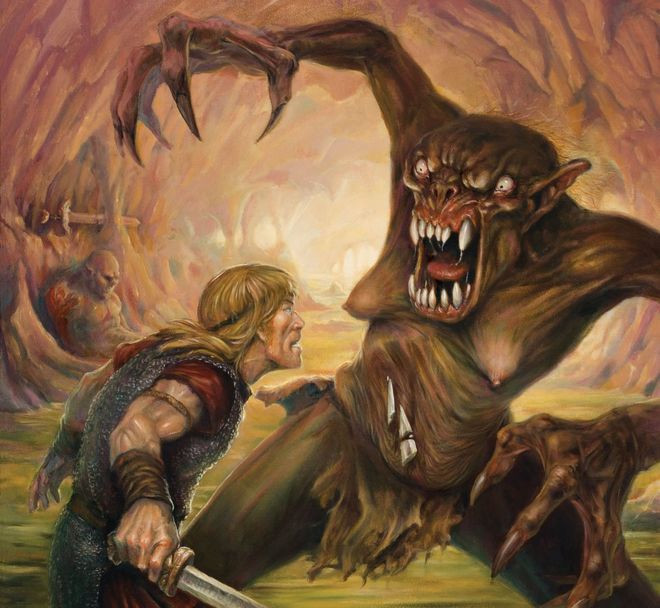Note: If you wish to receive, via e-mail, (1) my weekly newsletter or (2) daily copies of these posts, notify me at [email protected] and indicate which you would like. I promise not to share your e-mail address with anyone. To unsubscribe, send me a follow-up email.
Tuesday
Of the three monsters in Beowulf, the most intractable and the hardest to kill is Grendel’s Mother. In my reading, she is the monstrous form—the archetype—of out-of-control grief. Such grief could ravage 8th century warrior society, leading to tit-for-tat violence that led to generations-long blood feuds. When I look for contemporary instances of grief turning violent, Israelis and Palestinians often come first to mind.
Hamas’s terrorist attack on Israel—its goal is “the destruction of Israel”—and Israel’s horrific counter-response (cutting off food, water, and electricity to the citizens of Gaza, many of whom are anti-Hamas) may serve the purposes of demagogic politicos but, as is usually the case in such hostilities, the suffering is borne mainly by the innocent. Such is also the case in Beowulf: after the hero kills Grendel, it is not he who suffers GM’s retribution but Aeschere, King Hrothgar’s best friend.
I’ve written many times about the difference between the two trolls. Whereas Grendel’s rage is fueled by resentment—he feels unappreciated and neglected—his mother’s is fueled by sorrow. Those who have suffered loss, as both Israelis and Palestinians have, can brood for years before their rage explodes into murderous violence. The poem describes this place of brooding as “fearful waters” and “cold depths.” GM, we learn, is related to the Bible’s most famous murderer:
Grendel’s mother, monstrous hell-bride, brooded on her wrongs.
She had been forced down into fearful waters,
the cold depths, after Cain had killed
his father’s son, felled his own
brother with a sword. Branded an outlaw,
marked by having murdered, he moved into the wilds,
shunned company and joy. (trans. Seamus Heaney)
The “dark waters” are further described later on. Encountering the demon of sorrow is so frightening, the poem tells us, that a stag pursued by hounds would sooner be torn apart on the shore that leap into those cold depths:
A few miles from here
The haunted mere a frost-stiffened wood waits and keeps watch
above a mere; the overhanging bank
is a maze of tree-roots mirrored in its surface.
At night there, something uncanny happens:
the water burns. And the mere bottom
has never been sounded by the sons of men.
On its bank, the heather-stepper halts:
the hart in flight from pursuing hounds
will turn to face them with firm-set horns
and die in the wood rather than dive
beneath its surface. That is no good place.
When wind blows up and stormy weather
makes clouds scud and the skies weep,
out of its depths a dirty surge
is pitched towards the heavens
People who live in those depths—let’s start with the genocidal Hamas terrorists who indiscriminately slaughtered any civilians they encountered—have forfeited their humanity. The trolls in the poem are described as cut off from civilization:
They are fatherless creatures,
and their whole ancestry is hidden in a past
of demons and ghosts. They dwell apart
among wolves on the hills, on windswept crags
and treacherous keshes, where cold streams
pour down the mountain and disappear
under mist and moorland.
King Hrothgar is clear that GM’s attack is part of a continuing blood feud:
[S]he has taken up the feud
because of last night, when you killed Grendel,
wrestled and racked him in ruinous combat
since for too long he had terrorized us
with his depredations. He died in battle,
paid with his life; and now this powerful
other one arrives, this force for evil
driven to avenge her kinsman’s death.
In other words, there seems no end, which is why Hrothgar—like many observes of Middle East hostilities—is in despair:
Then Hrothgar, the Shieldings’ helmet, spoke:
“Rest? What is rest? Sorrow has returned.
Alas for the Danes! Aeschere is dead.
He was Yrmenlaf’s elder brother
her son and a soul-mate to me, a true mentor,
my right-hand man when the ranks clashed
and our boar-crests had to take a battering
in the line of action. Aeschere was everything
the world admires in a wise man and a friend.
Then this roaming killer came in a fury
and slaughtered him in Heorot.
The poem strikes a hopeful note in assuring us that GM can be defeated, and it shows us how. It’s important to note that merely lashing at her with a sword doesn’t work, just as slashing at Afghanistan and Iraq after 9-11 didn’t work (and Iraq was actually innocent). Instead, the killing in Afghanistan went on for 17 years until the United States finally gave up and got out while those who had housed Al Kaieda emerged triumphant.
In Beowulf’s case, the sword he initially wields against GM in her underwater lair proves ineffective, shattering upon contact. Instead, “deeper magic”—as C.S. Lewis calls it in The Lion, the Witch, and the Wardrobe—is called for. In Beowulf, this takes the form of a giant sword found in the lair.
As I read it, this sword for the Anglo-Saxons is their higher purpose, something that can take their society beyond perpetual blood feuds. Think of it as a principle so lofty and so authoritative that conflict ends.
I admit that this sounds like fantasy, and the poem itself goes on to recount one damn death after another, as though Beowulf never wielded that sword. One can see why Hrothgar is so discouraged. But at least a vision has been articulated, just as Israeli and Palestinian peace activists continue to uphold a vision of coexistence.
They do this even as their revenge-obsessed fellow citizens attempt to silence them. That know only too well that whatever punishment Israel now metes out to Hamas and Gaza will simply perpetuate the feud.
